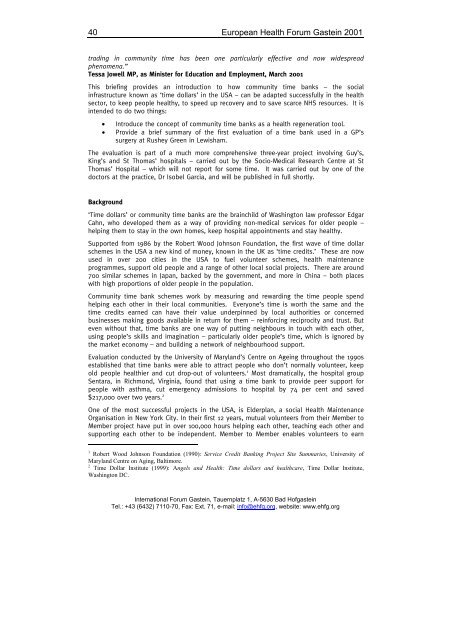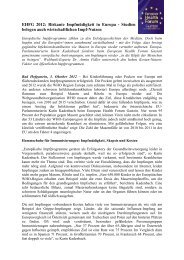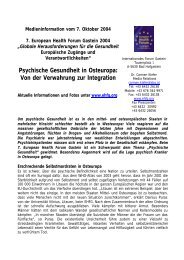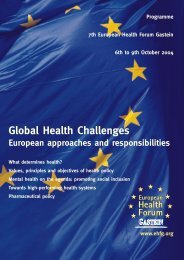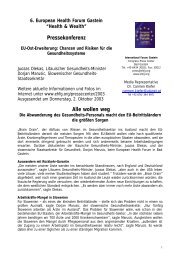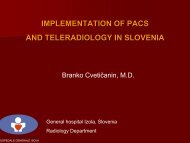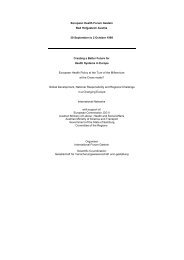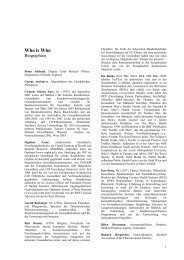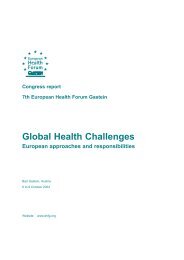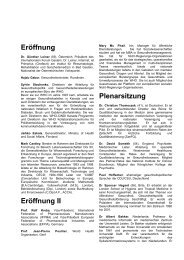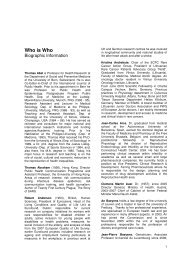Congress report - European Health Forum Gastein
Congress report - European Health Forum Gastein
Congress report - European Health Forum Gastein
Create successful ePaper yourself
Turn your PDF publications into a flip-book with our unique Google optimized e-Paper software.
40<br />
<strong>European</strong> <strong>Health</strong> <strong>Forum</strong> <strong>Gastein</strong> 2001<br />
trading in community time has been one particularly effective and now widespread<br />
phenomena.”<br />
Tessa Jowell MP, as Minister for Education and Employment, March 2001<br />
This briefing provides an introduction to how community time banks – the social<br />
infrastructure known as ‘time dollars’ in the USA – can be adapted successfully in the health<br />
sector, to keep people healthy, to speed up recovery and to save scarce NHS resources. It is<br />
intended to do two things:<br />
• Introduce the concept of community time banks as a health regeneration tool.<br />
• Provide a brief summary of the first evaluation of a time bank used in a GP’s<br />
surgery at Rushey Green in Lewisham.<br />
The evaluation is part of a much more comprehensive three-year project involving Guy’s,<br />
King’s and St Thomas’ hospitals – carried out by the Socio-Medical Research Centre at St<br />
Thomas’ Hospital – which will not <strong>report</strong> for some time. It was carried out by one of the<br />
doctors at the practice, Dr Isobel Garcia, and will be published in full shortly.<br />
Background<br />
‘Time dollars’ or community time banks are the brainchild of Washington law professor Edgar<br />
Cahn, who developed them as a way of providing non-medical services for older people –<br />
helping them to stay in the own homes, keep hospital appointments and stay healthy.<br />
Supported from 1986 by the Robert Wood Johnson Foundation, the first wave of time dollar<br />
schemes in the USA a new kind of money, known in the UK as ‘time credits.’ These are now<br />
used in over 200 cities in the USA to fuel volunteer schemes, health maintenance<br />
programmes, support old people and a range of other local social projects. There are around<br />
700 similar schemes in Japan, backed by the government, and more in China – both places<br />
with high proportions of older people in the population.<br />
Community time bank schemes work by measuring and rewarding the time people spend<br />
helping each other in their local communities. Everyone’s time is worth the same and the<br />
time credits earned can have their value underpinned by local authorities or concerned<br />
businesses making goods available in return for them – reinforcing reciprocity and trust. But<br />
even without that, time banks are one way of putting neighbours in touch with each other,<br />
using people’s skills and imagination – particularly older people’s time, which is ignored by<br />
the market economy – and building a network of neighbourhood support.<br />
Evaluation conducted by the University of Maryland’s Centre on Ageing throughout the 1990s<br />
established that time banks were able to attract people who don’t normally volunteer, keep<br />
old people healthier and cut drop-out of volunteers. 1 Most dramatically, the hospital group<br />
Sentara, in Richmond, Virginia, found that using a time bank to provide peer support for<br />
people with asthma, cut emergency admissions to hospital by 74 per cent and saved<br />
$217,000 over two years. 2<br />
One of the most successful projects in the USA, is Elderplan, a social <strong>Health</strong> Maintenance<br />
Organisation in New York City. In their first 12 years, mutual volunteers from their Member to<br />
Member project have put in over 100,000 hours helping each other, teaching each other and<br />
supporting each other to be independent. Member to Member enables volunteers to earn<br />
1<br />
Robert Wood Johnson Foundation (1990): Service Credit Banking Project Site Summaries, University of<br />
Maryland Centre on Aging, Baltimore.<br />
2<br />
Time Dollar Institute (1999): Angels and <strong>Health</strong>: Time dollars and healthcare, Time Dollar Institute,<br />
Washington DC.<br />
International <strong>Forum</strong> <strong>Gastein</strong>, Tauernplatz 1, A-5630 Bad Hofgastein<br />
Tel.: +43 (6432) 7110-70, Fax: Ext. 71, e-mail: info@ehfg.org, website: www.ehfg.org


